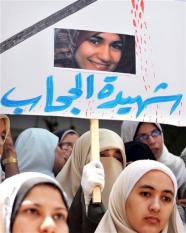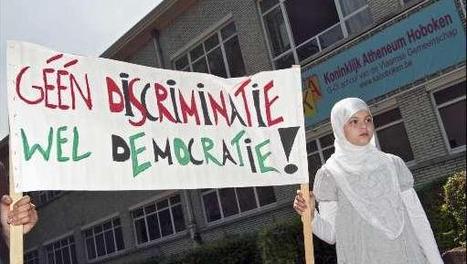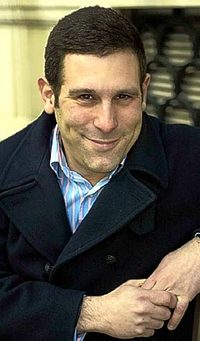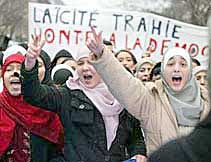“Isn’t it ironic that someone writing against hijab can describe it as ‘soaked in blood’ less than a week after a pregnant woman was stabbed to death in Europe by a man who had harassed her for wearing hijab?”
Yusuf Smith replies to Rahila Gupta.

“Isn’t it ironic that someone writing against hijab can describe it as ‘soaked in blood’ less than a week after a pregnant woman was stabbed to death in Europe by a man who had harassed her for wearing hijab?”
Yusuf Smith replies to Rahila Gupta.
A self-proclaimed white supremacist with a history of threats and harassment was charged under the state’s hate crime statute after he allegedly threatened a young Muslim woman with a knife while she was waiting in line for services at the Seattle Indian Health Board.
According to charging papers, Eric Lee Garner walked up to the woman on July 1, pointed at her head scarf and said, “you Muslim people scare people when you wear things like that!” He followed up with other derogatory remarks.
The woman, who was holding her six-month-old son, tried to reason with the 24-year-old Auburn man by saying that her “her clothing does not make her a bad person,” court documents said. When the insults didn’t stop, prosecutors said, the woman backed away from Garner and tried to shield her son from him.
Garner then cursed at the woman, got in her face and pulled out a large sheathed knife, court papers said. Garner told the woman he was going to “cut” the woman and her baby with the knife, charging documents said.
A health board employee then grabbed the knife and retreated behind the counter, prosecutors said. Garner jumped over the counter, grabbed the knife and ran out of the building.
Update: See “Auburn man sentenced in attack of Muslim woman, baby”, KOMO News, 23 April 2010
French lawmakers opened hearings Wednesday on whether to ban the burka, calling in experts who said France should act to discourage Muslim women from wearing the head-to-toe veil.
Islam expert Abdennour Bidar called the full veil a “pathology of Islam” embraced by hardline Salafists who tell Muslim women to cover themselves as a way to “get back to their roots”. “It’s up to the republic to help Islam in our country choose its destiny and help French Muslims resist this pressure,” said Bidar. “We must find ways to prevent the burka from spreading.”
Anthropologist Dounia Bouzar said young women had in recent years taken to wearing the full veil after being indoctrinated by “gurus” who pervert Islam’s teachings. She suggested that measures be adopted under France’s security laws barring citizens from concealing their identities by covering their faces, be it with a niqab, a ski mask or even a paper bag. Such a measure would apply equally to all citizens and ensure that France’s five million Muslims do not feel stigmatized for their religion, she argued.
As the hearings got under way, the leader of the governing right-wing majority in parliament came out in favour of a law banning the burka but said it should be preceded by a period of “dialogue” of six months to a year. “We must prohibit what should be prohibited but only after having explained why,” said Jean-Francois Cope, a leading figure in Sarkozy’s UMP party, in an interview to Le Parisien newspaper.
See also Bloomberg, 8 July 2009
 It was while Marwa el-Sherbini was in the dock recalling how the accused had insulted her for wearing the hijab after she asked him to let her son sit on a swing last summer, that the very same man strode across the Dresden courtroom and plunged a knife into her 18 times. Her three-year-old son Mustafa was forced to watch as his mother slumped to the courtroom floor.
It was while Marwa el-Sherbini was in the dock recalling how the accused had insulted her for wearing the hijab after she asked him to let her son sit on a swing last summer, that the very same man strode across the Dresden courtroom and plunged a knife into her 18 times. Her three-year-old son Mustafa was forced to watch as his mother slumped to the courtroom floor.
Even her husband Elvi Ali Okaz could do nothing as the 28-year-old Russian stock controller who was being sued for insult and abuse took the life of his pregnant wife. As Okaz ran to save her, he too was brought down, shot by a police officer who mistook him for the attacker. He is now in intensive care in a Dresden hospital.
While the horrific incident that took place a week ago tomorrow has attracted little publicity in Europe, and in Germany has focused more on issues of court security than the racist motivation behind the attack, 2,000 miles away in her native Egypt, the 32-year-old pharmacist has been named the “headscarf martyr”.
She has become a national symbol of persecution for a growing number of demonstrators, who have taken to the streets in protest at the perceived growth in Islamophobia in the west. Sherbini’s funeral took place in her native Alexandria on Monday in the presence of thousands of mourners and leading government figures. There are plans to name a street after her.
Unemployed Alex W. from Perm in Russia was found guilty last November of insulting and abusing Sherbini, screaming “terrorist” and “Islamist whore” at her, during the Dresden park encounter. He was fined €780 but had appealed the verdict, which is why he and Sherbini appeared face to face in court again.
Even though he had made his anti-Muslim sentiments clear, there was no heightened security and questions remain as to why he was allowed to bring a knife into the courtroom.
Angry mourners at the funeral in Alexandria accused Germany of racism, shouting slogans such as “Germans are the enemies of God” and Egypt’s head mufti Muhammad Sayyid Tantawy called on the German judiciary to severely punish Alex W.
In Germany the government of Angela Merkel has been sharply criticised for its sluggish response to the country’s first murderous anti-Islamic attack. The general secretaries of both the Central Council of Jews and the Central Council of Muslims, Stephen Kramer and Aiman Mazyek, who on Monday made a joint visit to the bedside of Sherbini’s husband, spoke of the “inexplicably sparse” reactions from both media and politicians.
They said that although there was no question that the attack was racially motivated, the debate in Germany had concentrated more on the issue of the lack of courtroom security. “I think the facts speak for themselves,” Kramer said.
 On Sunday about 120 Muslims protested in Antwerp against the headscarf ban in the Royal Athenaeums of Antwerp and Hoboken.
On Sunday about 120 Muslims protested in Antwerp against the headscarf ban in the Royal Athenaeums of Antwerp and Hoboken.
They carried signs saying: “Everybody free, except us,” “Democracy, not discrimination” and “You are the oppressors, not us.” They demanded to rescind the headscarf ban by the two schools.
Parent Mina Cheeba said in a speech that the representatives of the parents in the school council haven’t heard of any social pressure to wear a headscarf and that if there are actual complaints, then they would like to take a look at them so they could come to a solution together.
Cheeba says the decision to ban the headscarf was made without asking the parents’ advice. The school regulations shouldn’t be changed autonomously, but by consultation with the parents.
Several students also expressed their displeasure. One said that they’re supposedly under pressure to wear a headscarf, but that’s nonsense. They are not feather-brains who accept everything without thinking.
Ayoub Aazzouti said that he’s fed up of the men being portrayed as machos who force girls to wear headscarves, because it’s not like that. “For us boys and girls are equal. We have a lot of respect for them and they are intelligent enough to decide on their own if they wear a headscarf or not. Stop using us as an excuse.”
On Monday about 40 Muslim women showed up to protest in front of the Royal Athenaeum of Hoboken. Some of the slogans included: “distressed by the lack of understanding”, “why a ban on my character”, and “lies in order to discriminate”.
One of the students spoke: “We have a right to study and to a headscarf. It’s not one or the other, we have a right to both.”
 Two pupils and their teacher were ordered to remove their face veils before they could make an official visit to a Roman Catholic school.
Two pupils and their teacher were ordered to remove their face veils before they could make an official visit to a Roman Catholic school.
The party were from an Islamic school in Great Harwood, Lancs and were visiting St Mary’s College in nearby Blackburn, which was staging its annual open day.
The two schoolgirls agreed to take off their niqab veils. However, their teacher refused and was taken into an office at the sixth form college and told she would not be allowed on the premises.
St Mary’s College yesterday defended the move, claiming that staff had requested that the trio remove the traditional Islamic veils because they are against the school’s dress policy.
Its principal Kevin McMahon said: “At the start of one of our ‘taster days’ for prospective students last week, some visitors did arrive wearing the veil. When the policy was explained to them, all except one were willing to remove it. This lady – a member of staff at the school – refused, and opted to leave the premises.”
See also the Times, Daily Mail and Daily Mirror.
 Spare a thought for poor, maligned David Toube. Today he posts an indignant article complaining that Lindsey German of the Stop the War Coalition has misrepresented him and his fellow bloggers at Harry’s Place. She can only get away with this, Toube writes piously, because she knows that “as a matter of principle, I will not sue for defamation”. Given that Toube regularly denounces Muslim activists he disagrees with as racists and fascists, and once described Inayat Bunglawala and myself as the “ideological wing” of the terrorists responsible for the attempted car bombing of Glasgow airport, perhaps he should be grateful that his opponents apply the same principle when responding to his attacks on them.
Spare a thought for poor, maligned David Toube. Today he posts an indignant article complaining that Lindsey German of the Stop the War Coalition has misrepresented him and his fellow bloggers at Harry’s Place. She can only get away with this, Toube writes piously, because she knows that “as a matter of principle, I will not sue for defamation”. Given that Toube regularly denounces Muslim activists he disagrees with as racists and fascists, and once described Inayat Bunglawala and myself as the “ideological wing” of the terrorists responsible for the attempted car bombing of Glasgow airport, perhaps he should be grateful that his opponents apply the same principle when responding to his attacks on them.
“Hats off (or should that be chapeaux off?) to French President Nicolas Sarkozy for calling for a ban on the burkha in France…. No British politician would be brave enough to do what Sarkozy did or to follow through with what will almost certainly be a nation-wide ban on the burkha. Our politicians are, unlike our European amis, too cowed by political correctness and misguided multiculturalism to speak out on such a difficult topic and risk offending the two-million-strong Muslim population.
“Except the burkha isn’t a Muslim issue. It’s a British issue. It doesn’t just demean the woman who wears it, it also demeans the men and women who have to see her wearing it…. The idea of a ban is certainly not preposterous…. As Sarkozy pointed out the burkha is a political, not a religious, statement…. It is a direct and explicit criticism of our Western values and belief in the equality of men and women.”
Julia Hartley-Brewer in the Daily Express, 29 June 2009
The Independent on Sunday talks to ten British women about their decision to wear hijab.
 In the northern Paris suburb of Saint-Denis, with its busy market, fast-food joints and bargain clothes shops, Angelica Winterstein only goes out once a week – and only if she really has to.
In the northern Paris suburb of Saint-Denis, with its busy market, fast-food joints and bargain clothes shops, Angelica Winterstein only goes out once a week – and only if she really has to.
“I feel like I’m being judged walking down the street. People tut or spit. In a smart area west of Paris, one man stopped his car and shouted: ‘Why don’t you go back to where you came from?’ But I’m French, I couldn’t be more French,” said the 23-year-old, who was born and raised in bourgeois Versailles.
Once a fervent Catholic, Winterstein converted to Islam at 18. Six months ago she began wearing a loose, floor-length black jilbab, showing only her expertly made-up face from eyebrows to chin. She now wants to add the final piece, and wear full niqab, covering her face and leaving just her eyes visible.
“But this week, after Sarkozy announced that full veils weren’t welcome in France, things have got really difficult,” she said. “As it is, people sometimes shout ‘Ninja’ at me. It’s impossible to find a job – I’m a qualified childminder and get plenty of interviews because of my CV, but when people see me in person, they don’t call back. It’s difficult in this country, there’s a certain mood in the air. I don’t feel comfortable walking around.”
Human rights groups warned this week that the row over niqabs risks exacerbating the growing problem of discrimination against women wearing standard Muslim headscarves. Five years on from the heated national debate over France’s 2004 law banning headscarves and all conspicuous religious symbols from state schools, there has been an increase in general discrimination against adult women who cover their heads.
“Women in standard headscarves have been refused access to voting booths, driving lessons, barred from their own wedding ceremonies at town halls, ejected from university classes and in one case, a woman in a bank was not allowed to withdraw cash from her own account at the counter. This is clear discrimination by people who wrongly use the school law to claim that France is a secular state that doesn’t allow headscarves in public places. It’s utterly illegal and the courts rule in our favour,” said Renee Le Mignot, co-president of the Movement Against Racism and for Friendship Between Peoples. “Our fear is that the current niqab debate is going to make this general discrimination worse.”
Samy Debah, a history teacher who heads France’s Collective against Islamophobia, said 80% of discrimination cases reported to his group involved women wearing standard headscarves. He had rarely seen any instances of women wearing niqabs, even in the ethnically mixed north Paris suburb where he lives. “From our figures, the biggest discriminator against Muslim women is the state and state officials,” he said. “What people have to understand is that the concept of French secularism is not anti-religion per se, it is supposed to be about respecting all religions.”
Horia Demiati, 30, a French financier who wears a standard headscarf with her business suits, said: “I really fear an increase in hatred.” She recently won a discrimination case after she and her family, including a six-month baby, were refused access to a rural holiday apartment they had booked in the Vosges. The woman who refused them argued that she was a secular feminist and didn’t want to see the headscarf, “an instrument of women’s submission and oppression”, in her establishment.